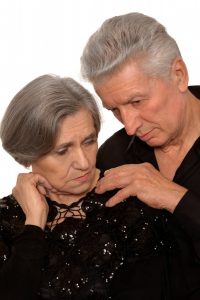 A Mom’s Story
A Mom’s Story
My daughter, Delores, was on the wrong path for many years. My husband, our adult children, and I agreed that she should no longer live with us. She had signed herself into a local mental health facility where she was being treated for bipolar disorder and drug addiction. So she wasn’t living with us at the time we received the call. When she called she was hysterical and cried, “MOM, I killed someone!”
What happened was that her friend, Margaret, a heroin addict, visited her at the facility and convinced the staff that she had an apartment to share with her. Delores was able to sign herself out and proceeded, along with her friend, to drive her car to the apartment. The apartment actually belonged to Margaret’s boyfriend and she wasn’t allowed to be there when he wasn’t present. The women drank for several hours and when the boyfriend arrived home he was furious because he was trying to straighten Margaret out, and he threw them both out.
The two women drove off in Delores’ car. Driving down a four-lane highway, Delores sideswiped a car, which flew into oncoming traffic and was hit by a much larger car. The driver was killed instantly and the driver of the other car was seriously injured. Due to her condition, Delores did not realize the seriousness of what occurred and she continued to drive. She pulled into an area off the road. Another car had followed her and contacted the police and they arrived shortly thereafter. She was belligerent and combative with the police and tried to intimidate them with the fact that her brother works in law enforcement. When she was informed that there was a fatality in the accident she was immediately inconsolable.
When Delores called us and said she killed someone there were no words to explain how I felt; I was in shock. I asked her how this happened in the hospital and she said, “No, I left the hospital and got drunk and had an accident.” I could barely understand her because of her sobbing. She kept saying it should have been her. I dropped to my knees. I asked to speak to an officer. He confirmed what she told me. I told him my husband and I were on our way; it was an hour’s drive. When we arrived we were told we could not see Delores. We were able to visit her prior to the trial and were assigned visiting days. The waiting time to see her was sometimes long and the waiting room so crowded that sometimes people had to stand. The visits were about 25 minutes long and through glass and with a phone.
We never could have imagined that something like this could happen in our family. We were in our 70’s and it was devastating for us and our entire family. We were so concerned for Delores and yet angry for what she had done with her life. The man who lost his life was a local man and an acquaintance of some of our children. A member of his family attended school with a member of ours.
We made a decision not to hire an attorney. Delores was upset with us, but we were sticking to the tough love decision we made before the accident. No more enabling. We were drained mentally, physically and financially.
She was assigned a Public Defender who she had confidence in. However, before the trial a different Public Defender was assigned and she seemed inexperienced and “folded” during the trial, in my opinion.
 The Trial
The Trial
We went to court four or five times. It was very difficult being there with the victim’s family. They are good, family people, who like us, never imagined that they would be in this position. This was their brother, uncle, friend. Listening to the statement from the family was heartbreaking for everyone, especially Delores. They wanted justice for their family member’s death, and we understand. I think the sister was shocked when I approached her and said, “I’m very sorry that a member of our family has caused such devastation for your family.” She put up her hands and said nothing. After the sentencing she asked if I would like a picture of her brother and she gave me the card from the funeral with his picture and prayer. Members of their family hugged our family members. They never left my mind and for almost eight months I had Post-Traumatic Stress Disorder (PTSD). It did get a little bit better, but I’ll never forget. I still think of them daily and pray that it has gotten easier for them.
Visiting Prison

Prison 1
Delores remained in the county jail for a short time and then was taken to a State Prison for Women. We had no contact with her for six weeks because she was in “intake”. She was waiting to be cleared of diseases and filled out paperwork including a list of telephone numbers she could receive and a visitors’ list.
After we were approved, we scheduled a visit to the prison, which was two hours from our home. No one prepared us for the visit. I did, however, check online so we were prepared with two forms of ID (one picture ID). This is a very strict policy as we learned when our granddaughter forget her wallet and was not allowed to visit and was asked to leave the premises. She was an innocent-looking 20 year old college student. There are no exceptions. Although it inconvenienced us, I accept that.
Proper attire is required. We were frisked by a same-sex guard and all of our items had to be locked in a locker. Chewing gum is not allowed. My husband’s heart pills were held by the guard and returned when we left. We brought in a $20 (max) card to purchase food from the vending machines. Visitors can use the vending machines, inmates remain seated during the visit. A table is assigned, as well as a specific seat for the inmate. The tables are round and seat 2-4 or long and seat 6-8; all were molded plastic. We were able to hug Delores on arriving and leaving. We could also hold hands, however, if anyone got too touchy they were nicely reprimanded (the first time). The visiting area had a section with toys, cards, and board games for visitors and inmates to use.
The prison is old and deteriorating, but effort is made to keep it painted and sanitary in the public areas. Inmates are assigned duties and wastebaskets are continually being emptied and table tops being sanitized.
Prison 2
The second prison that Delores was sent to was three hours from our home. It was a long day for us; our health was declining and the ten-hour day was becoming too much. The escorted walk from the CO (Correctional Officer) building to the visitors’ room was very difficult for me. We’d have to let the guard know when we were ready to leave and the guard would then take a group on the hour. The reason for this was that the CO building was not attached to the visiting area, so we had to be escorted out of the prison.
The visiting room is hot. There are a couple of fans and a window air conditioner. It is rather depressing and so noisy that it’s hard to hear one another. If there were only a few visitors we could visit as long as we wished during the allowed visiting hours. We never visited on weekends or holidays, therefore we had no time restrictions because of visitors waiting.
Visitors and inmates need permission to use the washroom. Inmates get frisked; visitors do not. The guard unlocks the door, which then locks. When ready to leave you flip a switch and light goes on and the guard unlocks the door. If these measures were not taken there would be plenty of opportunity to pass contraband while using the washroom, I assume.
Visiting the prison was not an especially bad experience. The Staff was always very polite and accommodating. We were friendly and respectful and were treated that way in return. The difficult part was leaving Delores there and remembering why she was there. All the needless pain and suffering over her poor choice.
Money, Phone Calls, and Reading Material
We wired Delores $100 monthly for commissary, more if she needed items like TV, shoes, or a fan. We replaced the TV when it was taken from her as punishment for loaning it to another inmate. The TVs are made of transparent plastic so nothing can be hidden. We sent extra money on holidays and birthdays.
Phone calls were very expensive in the first prison, around $8 for 30 minutes and half the price for the second prison, which was further away. Quite often we would get cut off during a call, and always if we remained on after the 30 minutes. Calls are made collect by the inmate. Delores would call often and when she was upset she would call every day. We always accepted her calls.
We subscribed to several magazines for Delores and paper-backed books through the mail often. She shared with the other women in the prison. We continue to send the subscriptions to her roommate.
My Observations and Opinions
We visited Delores 37 times in the 7 1/2 years she was incarcerated.
When visiting it is so obvious that so many people are involved in an inmate’s incarceration. Because I can relate, I think of senior grandparents visiting with babies and toddlers. Where is the energy at 70 or 75 to care for these little ones. Perhaps they are financially burdened as well. I see the love. Mothers and babies crying when it is time to say goodbye…heartbreaking.
Once Delores phoned and asked me to speak with her friend who was devastated after hearing of her sister’s suicide. Delores thought I could calm her because Delores called me to calm her down every time she was upset. I talked with the girl for the 30 minutes allowed. I believe the CO looked the other way even though this was a violation. I believe that most CO’s have heart.
Health Care
They do the best they can with the overcrowding and limited budget. Inmates have to wait weeks at times to see a health care professional. They “drop a slip” and then wait to be called. Broken bones sometimes begin to heal before they are treated. Delores had terrible menstrual cramps and heavy bleeding and was given Depo-Provera shots. She did not menstruate for years. After prison, when no longer taking the shots, she bled almost non-stop and had terrible cramps. She had a complete hysterectomy due to endometriosis. I am wondering if they gave Depo–Provera so they don’t have to deal with women’s issues.
The mental health providers were changed frequently. Delores liked most but never really established a relationship. When an inmate calls for “Crisis” I think they should get immediate help. At times when Delores was depressed and/or suicidal she called for Crisis and was ignored or refused. Friends would console her and pray with her. Haters would tell her, “Why don’t you kill yourself”.
Delores “stripped out” 13 times. You are stripped out if you are deemed to be a danger to yourself or others. Stripped naked except for a smock, which is like a sleeveless pullover shirt made of a special material that cannot be torn. There is NOTHING in the cell. Six squares of toilet tissue for the day. No sanitary products for women when menstruating. No blanket, books, mattress, nothing but concrete. One has to earn these privileges. Hardly a climate to restore mental health. Physically safe. Mentally disastrous. Segregation, or “the Hole” is similar to this. People are kept there for punishment but I think it could make them lose their minds. Isolation may be necessary, but this is barbaric. Surely reading material would be appropriate.
The Release
Delores had a release date; we always knew when she would get out. We are told to be there at 7:00am. After driving over three hours, my husband and son waited a couple of hours before Delores was released. There was some confusion with the paperwork. She wore a sweat suite that she had purchased from the commissary.
We had been positive that Delores could never stay with us again. We began to change our minds when we realized how much she had changed. The social workers, doctors, and family members were adamant that she should go to a halfway house. After investigating that option and speaking with staff at the prison, we agreed that Delores could be paroled to our home, with the understanding that a call to the parole officer would have her removed immediately. We thought she deserved a chance.

She has been with us for a year. She had an ankle bracelet for three months. She could leave the house for two hours, three designated times a week.
Delores is unable to drive. She does not associate with undesirable people. She is clean and sober. She is active in a church support group. She has mastered the I-Pad on her own, reads the Bible and inspirational material and self-help books. She has spoken of her addiction and crime in public and plans to do more in the future. Her relationships with her siblings is going well. She is especially thrilled with her relationship with her nieces and nephews, many who grew up while she was away.
Delores has a fiancé – a very solid sweet bachelor who she met when she was 14 years old. He was upset when he found out she was in prison, wrote her, and then contacted her after she got home.
On the other hand Delores and gotten several tattoos and several piercings (Ugh!). A Lily with my name on one arm, Fire Department symbol with her father’s name on the other arm, and Born Again with the date of the accident on her upper arm.
Of course we have all had to adjust, two women in the house isn’t easy. Dad drives Delores to all of her appointments. It has gone much better than we hoped or anticipated. No really large problems. We still say, “I love you” and “I’m happy you are here” or “I’m happy to be home”.
Life looks promising, but we will never forget the needless pain that was caused to another family.

Leave a Reply